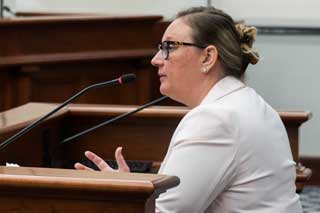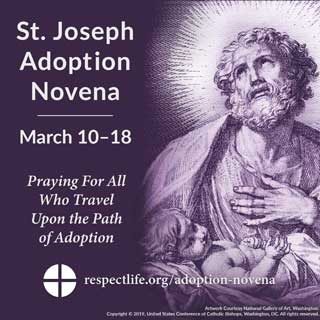Lansing Update: MCC Defends Vulnerable Women, Stands Against Commodifying Children
Posted March 8, 2024
Compensated Contracts for Surrogacy Puts Vulnerable Women at Risk of Exploitation, MCC Says
Allowing individuals to enter compensated contracts for the creation of children puts vulnerable surrogate mothers and their children at greater risk of exploitation, Michigan Catholic Conference (MCC) argued this week as lawmakers resumed consideration of legislation to allow compensated surrogacy contracts in this state.

House Bills 5207 through 5215 were rushed through the House last fall. This week marked the first public hearing on the package since they arrived in the Senate Civil Rights, Judiciary, and Public Safety Committee.
Earlier this year, Pope Francis made international news when he strongly condemned surrogacy because it “presents a grave violation of the dignity of the woman and the child” and called for the international community to “prohibit this practice universally.” The U.S. bishops followed shortly with a statement of their own in support of the Holy Father’s remarks.
As MCC has highlighted to lawmakers, legalizing compensated surrogacy contracts would make Michigan an outlier considering the broader international community largely recognizes surrogacy as a human rights violation. The European Union adopted a resolution stating that surrogacy “undermines the human dignity of the woman since her body and its reproductive functions are used as a commodity,” and a United Nations report found that commercial surrogacy “often involves abusive practices” and recommended a ban.
In its testimony before the Senate committee, MCC noted the legislation requires the intended parents to pay for the surrogate mother’s legal representation, signaling a financial disparity between the parties is expected from the onset. Women sometimes become surrogates due to financial pressure to pay their bills or get out of debt. The bill as written would likely not cover legal expenses for a contract dispute, making it likely the surrogate mother would be forced to succumb to the demands of the intended parents.
There’s also emerging evidence that shows increased health risks for surrogates, with the likelihood of experiencing more complicated, higher risk pregnancies.
MCC also shared with the committee instances of when surrogacy compensation gave rise to fraud. Unregulated surrogacy agencies have been known to take payments from the intended parents and not pay the surrogate, requiring the intended parents to pay twice to avoid breach of contract. In France, a surrogate was found guilty of defrauding prospective parents by telling them the baby was stillborn or had died, when instead she sold the healthy baby to another couple.
“Despite deep concern over such contracts, I sincerely want to acknowledge the suffering of those who experience infertility and recognize the value in the desire to have and raise a child,” said Rebecca Mastee, policy advocate for MCC, before the committee Thursday. “All babies are a blessing, and each person has the same dignity, regardless of the circumstances of their birth. Surrogacy, though, is much more than just helping someone have a baby.”
Supporters of the bills tout surrogacy as a path to parenthood for couples who suffer from infertility and desire children. Because of the social, moral, legal, and ethical problems associated with surrogacy, MCC encourages lawmakers to instead promote adoption as an alternative path to parenthood through increased state funding and public awareness campaigns.
The Senate committee took testimony only on the bill package this week.
In recent months, MCC has shared its concerns about the surrogacy legislation in Michigan with Catholic news outlets. Click or tap the links below to learn more about the issue:
- Surrogacy under the microscope, from Rome to Michigan: Aleteia, Feb. 22
- The Pope Is Battling to Ban Surrogacy Worldwide—and This US State Is at the Front Line: National Catholic Register, Jan. 11
Bill Ending Exorbitant Interest on Payday Loans Advances With MCC Support
Legislation supported by MCC to protect the needy from getting trapped in endless debt by predatory payday loans cleared a Senate committee this week with both Democratic and Republican support.
Senate Bill 632, sponsored by Sen. Sarah Anthony (D-Lansing), was reported to the floor by the Senate Finance, Insurance, and Consumer Protection Committee. The bill would cap the annual percentage rate (APR) tied to a payday loan at 36%, which would better protect consumers who take out loans with interest rates that currently go as high as 391% and average around 370%.
Many people who use these services are already low income and in need of one-time financial help, but the high cost and short-term timeline to repay the loans often trap them in a cycle of debt as they take out new payday loans to repay old ones. MCC, in testifying in support of the bill last week, pointed to the availability of low-interest, small-dollar loan alternatives across Michigan available for people in need.
To promote and advance Catholic social teaching that urges opposition to unjust business practices that take advantage of the poor and vulnerable, MCC issued an action alert to Catholic Advocacy Network members like you to urge state senators to support the bill.

To date, more than 300 messages have been sent—thank you for your engagement on this issue!
With the bill headed to the Senate floor, there’s still time to contact your state senator to urge their support for this legislation to better protect the poor of this state. Click or tap here to send a quick message.
The committee this week also approved House Bill 4343 by a unanimous vote, which would require the state to produce reports on payday lenders to help shed light on industry practices and help lawmakers and the public better understand the industry’s impact on the poor and vulnerable.
MCC also supports House Bill 4343, sponsored by Rep. Jennifer Conlin (D-Ann Arbor), which previously cleared the House on a broad bipartisan vote.
Support Those Touched by Adoption and Foster Care With St. Joseph Novena
In March, the Church celebrates the great St. Joseph, who was called to the heroic task of serving as Our Lord’s foster father.

To support families today who respond to the heroic call of foster care and adoption, join in praying a Novena to St. Joseph for those who travel the path of adoption, such as parents who place children for adoption, children who await adoption, parents who choose to adopt, and more.
The novena begins March 10 and runs through March 18, the day before the Solemnity of St. Joseph on March 19. To sign up to receive daily notifications to pray the novena, click or tap here.
